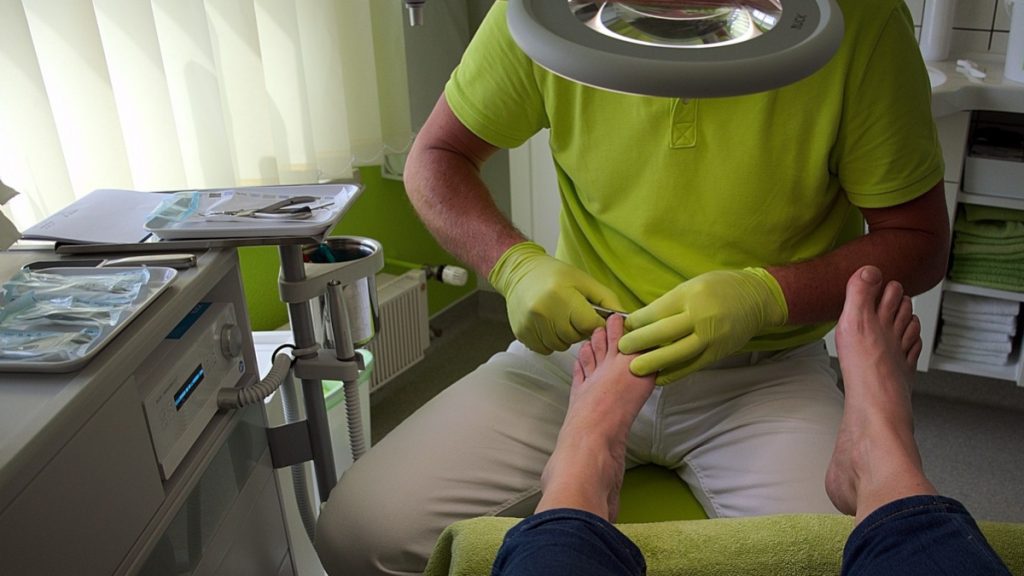Diabetic foot ulcers treatment in Dubai
An open wound on the foot is called a foot ulcer. It may be either a small red depression that affects only the surface of the skin, or it may also be very deep. A deep ulcer on the foot may spread across the entire thickness of the skin including bones, tendons, and other deep structures. Diabetic patients and people with poor circulation are more prone to develop foot ulcers.
What are diabetic foot ulcers?
Foot ulcers are a frequent cause of poorly regulated diabetes, developed as a result of the breakdown of skin tissue and exposure of the layers below. They are most prevalent under the balls of your feet and big toes and can impact your legs down to the bones.
Such ulcers may cause the skin to erode away, most likely due to weakened nerves in the feet caused by diabetes. Damaged nerves may also make it more difficult for you to experience discomfort or other signs of ulcers or even develop infections. This can prevent you from treating minor wounds until they become ulcers.
All diabetic patients can develop foot ulcers, however, it can be prevented by taking proper care. Treatment for such foot ulcers varies from cause to cause. You must discuss any foot discomfort with your doctor to make sure that this is not a serious issue, as untreated ulcers may lead to amputation if ignored.
Symptoms
Symptoms of diabetic foot ulcers are not always apparent. You may not even display signs of ulcers until the ulcer is infected. Consult your doctor if you experience any irritation, pain, or any new sensation especially in your foot. Some of the symptoms are mentioned below:
- Unfamiliar irritation, swelling, odors, and redness
- Any form of drainage from the foot
- Pain or numbness in a particular area
- Formation of black tissue surrounding the ulcer area
- Infection in toenails
- Cracks in the skin
- Open wounds taking longer to heal
Diagnosis
The doctor will assess your blood sugar level especially if you are a diabetic. He/she may evaluate the seriousness of the ulcer by assessing how deep it is, if there is an infection present, if the infection has spread to surrounding areas, your overall health condition, etc.
Certain tests may also be performed to better understand the severity of the ulcer. This may include X-rays, blood tests, bacterial cultures, bone scans, etc.
Causes
- High blood sugar may cause damage to your blood vessels and nerves. This decreases the flow of blood, especially to your legs, hands, and limbs, making it harder for cuts and sores to heal. You are more likely to catch an infection in such cases.
- Diabetes is also related to a disorder known as a peripheral arterial disease (PAD), which decreases the blood flow to your feet and legs, thereby increasing the chance to develop ulcers.
- Ulcers may also develop by stepping on something, blisters, cuts, improper and tight shoes, etc.
- Narrow arteries may also limit the blood flow to the feet of certain diabetic people, which can hinder the ability of the foot to heal properly. If the foot cannot heal, ulcers may develop.
- Dry skin is not uncommon in diabetes. Your legs could be more susceptible to cracking. Blisters, corn, and bleeding cuts may occur.
Prevention
By taking certain measures, you can reduce the risk of forming ulcers.
- Check your blood sugar levels regularly. Keeping normal glucose levels would also make it easier for any foot ulcer to heal faster. This may help prevent the ulcers from forming too.
- Keep your feet dry, clean, and moisturized.
- Inspect your feet regularly especially if you are a diabetic. Look for any cuts, sores, cracks, blisters, discoloration, redness, or other changes. Catching an ulcer or a sore early may prevent major problems.
- Avoid smoking as it may decrease the blood flow, damage the blood vessels, and slow the healing process.
- Avoid walking barefoot as it increases the chance of injuries.
- Use proper fitting shoes.
- Don’t treat the ulcer or any injury yourself.
- Change your socks regularly.
- Visit your doctor regularly to get your feet checked and examined.
Treatment
Typical foot ulcer wound treatment is debridement. This means a doctor cleans and removes all infected and dead tissue, debris, and any residual material from the respective area. The removal of this tissue activates the body’s own healing mechanism. The wound is then covered with a dressing which needs to be changed regularly.
You must also “offload” the affected portion of your foot. You may wear a cast or a surgical shoe to keep the weight off the wound until it heals.
In case the ulcer does not heal in few weeks, or if there is a bone infection, your therapist may recommend more advanced treatment options such as surgery or hyperbolic oxygen therapy (this includes breathing pure oxygen in a unique room to help the body recover).
Antibiotics may be prescribed in case there are any chances of an infection. In extreme cases, if the tissue dies, the doctor may need to amputate that particular part of your body.
Multidisciplinary foot care for diabetic patients is available at 7DMC, Dubai. We offer best-in-class treatment options suited to your need. Our doctors give personal attention to each patient to achieve the best results. We take proper care to make the patient understand the severity of the problem and the available treatment options. Call us for more information.
When to see a doctor?
You must consult your doctor immediately if you notice any discoloration, discomfort, pain, or numbness surrounding the area of soreness. If left untreated, it may cause infection and spread to other parts of the feet or legs. In such cases, ulcers can sometimes be treated either by amputation, surgery, or by replacing the skin with synthetic skin substitutes.
Conclusion
Anyone with diabetes is prone to develop foot ulcers. It is an open wound or sore usually at the bottom area of the feet. It forms due to various factors like poor circulation, irritation, and injuries. At times diabetic patients lose the ability to experience pain in their feet due to nerve damage and may not be aware of the issue. Talk to your doctor if you notice any symptoms.
Treatment of such ulcers depends on the severity. If detected early, the foot ulcers can be treated. See your doctor immediately if you develop a sore foot, as the risk of infection rises the longer you wait. Undiagnosed infections may involve amputation.
During the time when your foot ulcers heal, offload your feet, and follow the medication as advised by the doctor. It might take a few weeks to heal. In case your blood sugar level is high, it may even take longer. Following a strict diet, a healthy lifestyle, and taking the pressure off your feet is the most efficient way to heal your foot ulcers. When the ulcer is healed, regular preventive treatment may help you avoid the ulcer from ever recurring.
References:
https://health.clevelandclinic.org/diabetic-foot-ulcers-why-you-should-never-ignore-them/
https://www.healthline.com/health/diabetic-foot-pain-and-ulcers-causes-treatments#outlook
https://www.webmd.com/diabetes/diabetes-sores-ulcers-care
https://www.diabetes.co.uk/diabetes-complications/diabetic-foot-ulcers.html
- CATEGORIES : Skincare





